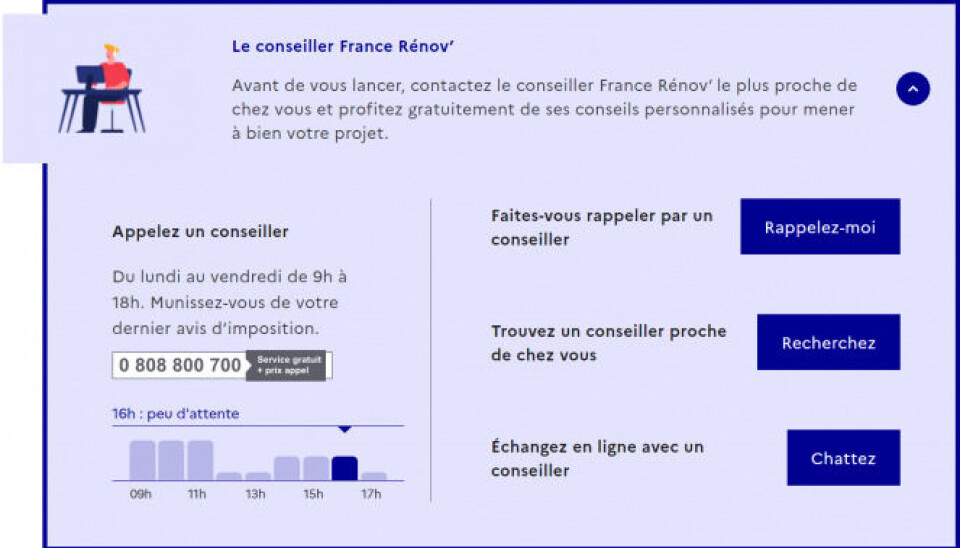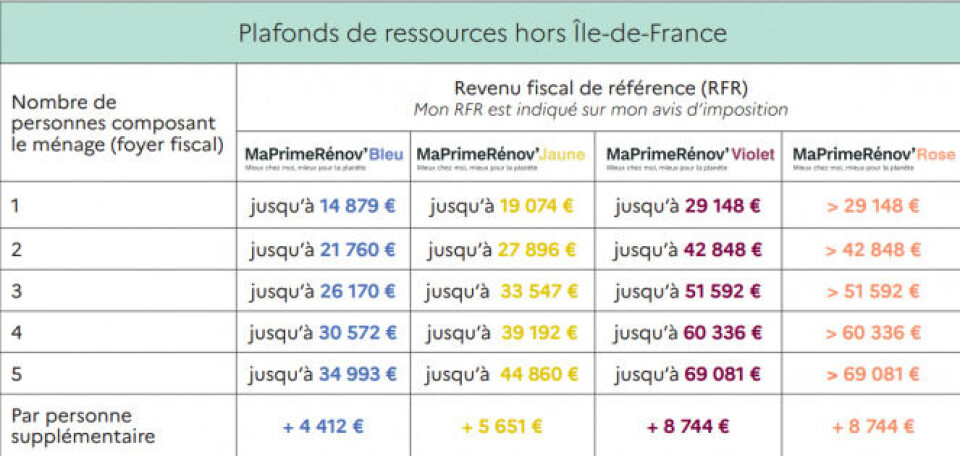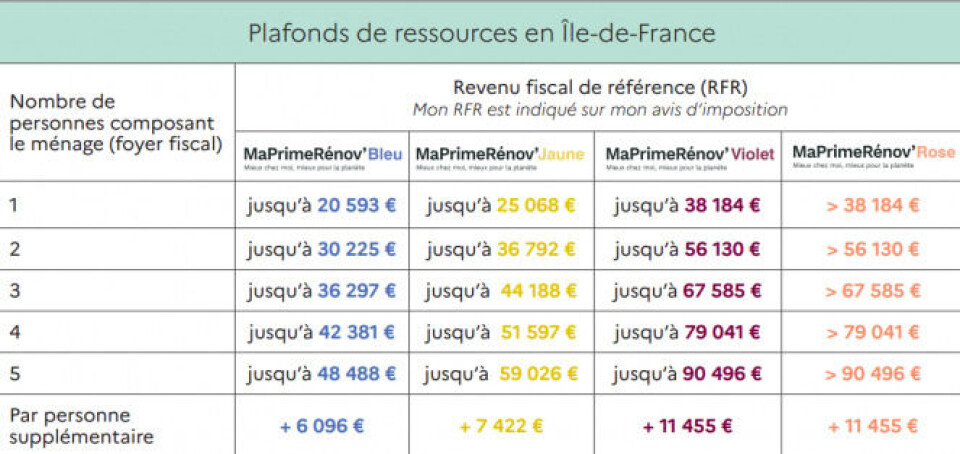-
Explained: how to register a classic car in France
It is relatively straightforward to get a carte grise véhicule de collection for your vehicle
-
How to fit in when you move to France: avoid that ‘expat bubble’
After two decades in central Brittany, Jill Fitzgerald O’Connor wants to help other movers feel part of their new community
-
Can you offer rentals in France when staying on visitor visa?
There are different thresholds for rentals before they are deemed as ‘professional income’
Explained: How to apply for a renovation grant for your French home
Anyone planning to do up a property to make it more environmentally sound could benefit from new France Rénov’ service. This includes second-home owners

France is encouraging energy-saving home renovations with a series of grants and aids available both for main and second homes.
To make the application process easier the government grouped the different options via a one-stop website called France Rénov at the beginning of the year.
The scheme came on the back of the growing success of the MaPrimeRenov' grant scheme, which was introduced in 2020 and helps homeowners improve energy-saving features such as insulation, ventilation and heating.
Anyone who owns a house in France and lives in it as their main residence or rents it out can benefit from the MaPrimeRénov’ grant, which can now be accessed through the new France Rénov’ service.
Second-home owners can access a different aid, through so-called Certificats d'économies d'énergie, which is also accessible through the platform.
We take a look at what the website offers, tips on how to use it, and who can get what in terms of state aid.
You can view the France Rénov’ website at this link here.
What is France Rénov’?
It is designed to be a one-stop-shop for all renovation projects. It aims to give people equal access to information on renovation work, guide them through projects and also provide social support for lower-income households through grants.
The France Rénov’ network is active throughout France and is supported by regional authorities. It is also linked to housing projects and benefits run by local authorities.
If you are looking to renovate your property in France to make it more energy efficient, or just to improve it, then you will be able to find all the information you need through France Rénov’, as well as getting help in carrying out the work.
France Rénov’ is free to access.
What does France Rénov’ consist of?
It is firstly a website: www.france-renov.gouv.fr.
There is also a national phone number where you can speak to France Rénov’ advisors, who can offer you help and advice before you set out to renovate your home. The phone number is: 0 808 800 700.
Finally, there are 450 France Rénov’ points around France, called Espaces Conseil France Rénov’.
You can go there to speak in person to a France Rénov’ advisor if you are planning to renovate your property and wish to get advice.
These centres are essentially a rebrand of current information points run under the Faire network or by the Anah association, which helps those on low-incomes and living in badly-insulated homes to improve their homes’ energy efficiency.
You can find your nearest France Rénov’ advice centre using this search tool.
Who is France Rénov’ for?
The website is divided into three sections, for private households (particuliers), the building sector professionals and local authorities.
Anyone who owns or rents property in France, whether it is a principal residence or a second home, can benefit from advice offered through a France Rénov’ advisor, but some kinds of aid require the home in question to be your main home.
Equally, almost all homeowners or tenants are eligible to benefit from some form of housing grants that can be accessed through the France Rénov’ platform.
This includes financial aid to renovate a home to make it more ecologically sound.
What does France Rénov’ offer?
Advice
A central element of France Rénov’ is helping individuals planning home renovation with advice.
A team of advisors are on hand to discuss projects, offer advice on what grants could be available to them and give estimates on how much renovations could cost.
This can be anything from getting double-glazing windows, upgrading a boiler or larger-scale building projects.
You can get an advisor to phone you, chat with one online, phone them directly or go to an Espaces Conseil France Rénov’ to speak to one in person.
There is no guarantee that the advisor will speak English. In this regard, the easiest option may be to go to speak to one in person at your nearest France Rénov’ centre. It is often easier to communicate in person rather than over the phone when there is a language barrier.
Follow this link to see more about the options for getting advice from a France Rénov’ advisor.

Simulations
The website allows you to run simulations to see what renovation aid you could be eligible for, and how much renovation projects could cost.
This service is called Simul’Aides, which you can find here.
In order to carry out the simulations, you will need:
-
To know the characteristics of your home (surface area, measurements, year of construction, etc.)
-
Have estimates of renovation work from companies (if you have already obtained then, if not, then it is not relevant)
-
Have your latest income tax avis with your Revenu Fiscal de Référence
Grant applications
MaPrimeRénov’ is now the main state aid for renovating elements of properties to make them more energy efficient. It is open to all homeowners, including those who live in their home (occupants) or those who rent it out (bailleurs).
Second home owners can not apply for this grant because one criterion is that you should live in the home for at least eight months of the year (another is that the property should be at least 15 years old). However they can apply for help under a different scheme called Certificats d'économies d'énergie (see below).
Also, for lower income households, MaPrimeRénov’ is not intended to fund wholesale energy-efficiency renovations of properties. For that, there is a separate grant called MaPrimeRénov’ Sérénité (formerly known as Habiter Mieux Serenité – see more about that here). Higher income households can, though, use MaPrimeRénov’ for larger renovation jobs.
The amount you can claim in grants for MaPrimeRénov’ depends on your income, but there is no maximum on this, meaning everyone is entitled to some amount of aid – the lower your income the more you can claim.
The government is aiming to finance renovation projects in between 400,000 - 500,000 properties per year.
What sort of renovation work can I get funding for under MaPrimeRénov?
-
Changing the heating system (or boiler)
-
Insulating the house (walls, floors, attic, windows)
-
Installing a ventilation system
What are the income levels for claiming the aid?
MaPrimeRénov’ grants are split into four colour categories from lower to higher incomes: blue (bleu), yellow (jaune), purple (violet), pink (rose).
Households with the lowest income rates fall into the blue category and can receive the highest amounts of aid. Households with the highest income rates fall into the pink category, and can receive the lowest amounts.
Households in the purple and pink categories can use MaPrimeRénov’ for large renovation projects aimed at improving the home’s overall energy efficiency, while households in the blue and yellow categories are eligible for the more beneficial MaPrimeRénov’ Sérénité for such projects.
The table below shows the income thresholds for each category, based on the number of adults in the household (foyer), for properties outside the Ile-de-France region.
It means, for example, a household in Dordogne with two adults living in it, whose joint income is €35,000 per year, will fall into the purple (violet) category.

The table below shows the income thresholds for each category, based on the number of adults in the household (foyer), for properties within the Ile-de-France region.
It means, for example, a household in Paris with two adults living in it, whose joint income is €50,000, you will fall into the purple (violet) category.

How do I claim for MaPrimeRénov’?
-
Find out what colour category your household falls into (you can do this through the simulation section on France Rénov’ (as outlined above in this article). If you are having trouble, consult an advisor at France Rénov’ (as explained above).
-
Verify through the simulations what type of aid you are eligible for
-
Create an account with MaPrimeRénov’ (see this link here) and submit your claim (demande de subvention).
Can MaPrimeRénov’ be combined with other grants?
Yes, it can be combined with an aid scheme called Certificats d’économies d’énergie (CEE). Second-home owners are eligible for this as well as main home owners. It can also potentially be combined with local authority grants known as aides des collectivités locales orAction logement. See more on these local grants here, or speak to an advisor at France Rénov’.
It should also be noted that the VAT rate for normal renovation work is generally 10%. However, for work related to improving the energy performance of a property, the rate is reduced to 5.5%.
Grant for second home owners
Second home owners are not entitled to MaPrimeRénov’ money, but can get financial support through the certificats d'économies d'énergie (CEE) scheme (energy saving certificates).
This was set up in 2006 with the objective of financing France’s transition to more energy efficient households. The grants are offered in conjunction with energy suppliers.
Homeowners can get money to carry out small projects, such as installing more efficient boilers or heat pumps, connecting their property to a heating network supplied by renewable energy, or insulating elements of their home.
Money can also be given for whole-house improvement projects. For individual houses, the renovation must lead to a reduction in energy consumption in the house by at least 55%.
For apartment blocks or shared properties, this must be at least 35%.
Advisors at France Rénov’ are able to talk you through how you can get funding through the CEE scheme.
Find certified professionals for renovation work
The France Rénov’ site also has a search function to allow you to find professionals in the building and renewable sector who have been certified for quality.
These professionals have a status called Reconnu garant de l’environnement (RGE).
You can also find recommended architects through the same search function.
Professionals with an RGE status are recommended for, for example, carrying out energy audits on properties, which will be required for all properties classed as F or G on the Diagnostic de performance énergétique (DPE) from September 1.
Read more:Shared walls, €7,800 house, notaire fees: Five French property updates
Mon accompagneuter Renov
Mon accompagnateur Rénov’ is another element of France Rénov’.
The accompagnateur is someone who can help guide homeowners through the process of upgrading or renovating their homes to make them more ecologically sound. This includes helping them find and access grants available to them, finding the right workers, filling out documents and overseeing the renovation work.
This service was launched on January 1 and is available through the France Rénov’ website.
Currently, the accompagnateurs are mostly associated with national housing renovation agency Agence nationale de l’habitat (Anah).
However, from January 1, 2023, certain other private operators will be able to act as advisors as part of Mon accompagnateur Rénov’s offering.
Draft rules for this change state that the private operators will have to “respect certain conditions of independence” regarding the renovation work.
In other words, they should not be associated with construction companies, architects or others in the building industry who they then advise customers to hire for their renovation work.
However four housing associations have asked that clarifications about this as we reported in one of our weekly property updates at this link.
Aid to prepare properties for old age or disability
Through France Rénov’ you can also find details about what financial aid and support there is if you are planning to renovate your house to prepare for older age.
There is a grant scheme called Habiter facile, for example.
The France Rénov’ website has all the information related to aid and help of this type, which you can see here.
You can also read more about Habiter facile in one of our weekly property updates here (third update in the article).
Previous articles
What is France Rénov aid scheme?
























